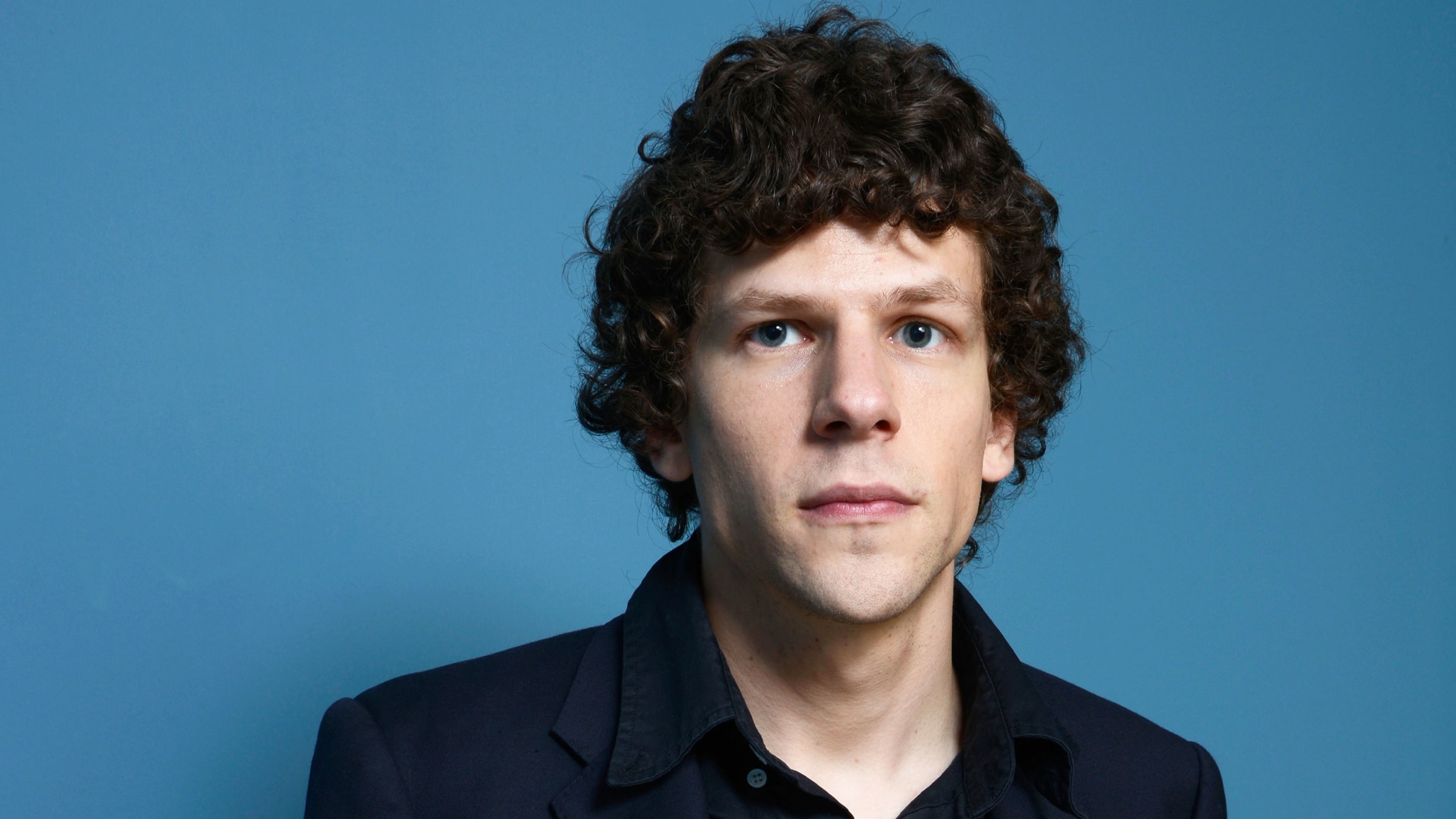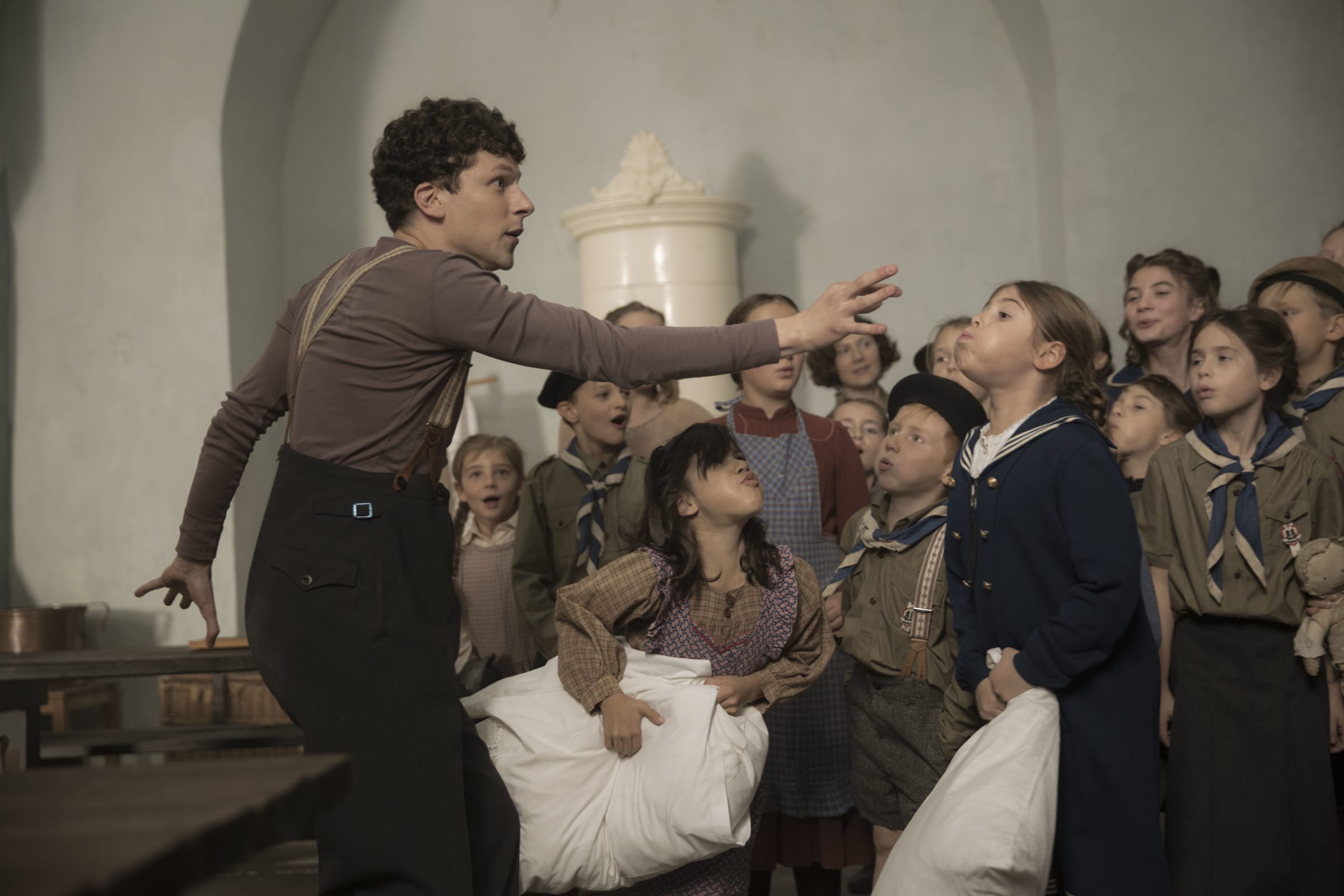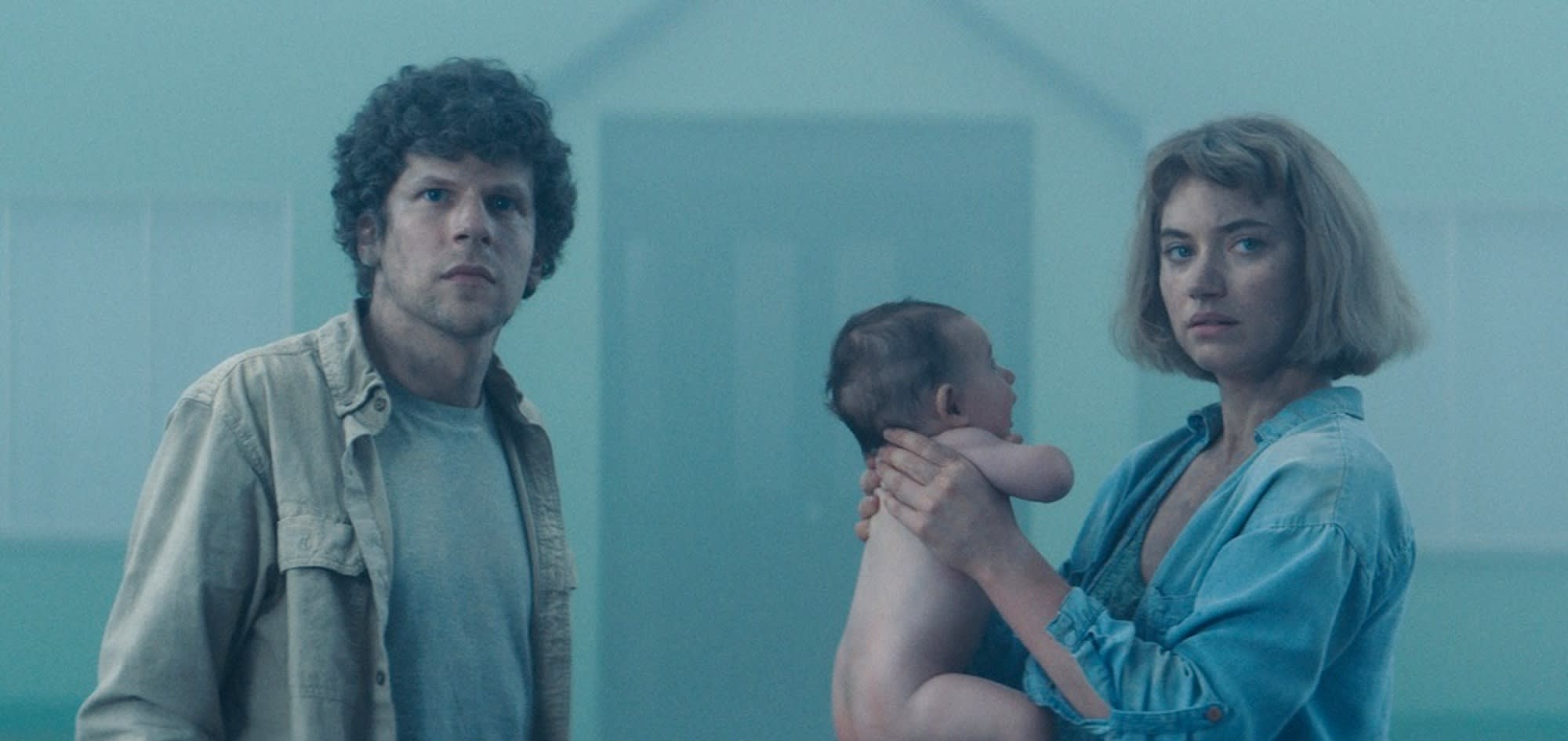Jesse Eisenberg on Nailing Mark Zuckerberg and Resisting Anti-Semitism

Larry Busacca/Getty
The Oscar-nominated actor opens up about his prescient turn as the Facebook co-founder, his new films “Resistance” and “Vivarium,” and the alarming rise of anti-Semitism.
Although the theatrical movie industry has been crippled by the novel coronavirus, original American films will continue to premiere in the coming weeks and months—online. And at the forefront of that wave of new releases is Jesse Eisenberg, who’ll headline two features debuting nationwide on Friday, March 27: Resistance, the based-on-real-events story of legendary French mime Marcel Marceau’s efforts to save orphaned Jewish children by working with his homeland’s anti-Nazi WWII resistance, and Vivarium, a surreal Twilight Zone-ish tale about a couple (Eisenberg and Imogen Poots) trapped in a bizarre housing complex from which there is no escape. On the face of it, the two projects couldn’t be more dissimilar. Except, of course, that they both now share an identical fate: bypassing multiplexes and art-house cinemas altogether for a simultaneous video-on-demand bow.
In the face of this uncharted-territory reality, Eisenberg concedes that “it feels strange to talk about anything else” besides the ongoing pandemic. Nonetheless, the 36-year-old actor—equally well-known for acclaimed indies (Roger Dodger, The Squid and the Whale) and big-studio blockbusters (Zombieland, Batman v Superman: Dawn of Justice)—remains hopeful that his current films will find an audience eager for entertainment, and distraction, during their indefinite quarantines. Moreover, he’s confident that both have something unique to say about our insane present moment, be it the rise of anti-Semitism here and abroad (and the need to hide out in order to guarantee the safety of one’s self and others), or the calamitous pitfalls of suburban domesticity—the latter topic proving all the more relevant as individuals and families heed warnings to stay at home.
Does it feel strange to be promoting these movies just as so many theaters are closing, thereby sending your movies directly to VOD?
On the one hand, it feels strange to talk about anything else, of course. And on the other hand, you want to have some semblance of normalcy as a culture, because a lot of people are inside, healthy, and bored. For a lot of people, there’s a feeling of disconnectedness and boredom rather than just pure terror—or maybe the two are butting up against each other.
So on the one hand it feels weird to talk about something else, but on the other, you have to, because people are certainly still going to be watching movies. And these movies, in their two different ways, probably feel relevant in some way. One movie, Vivarium, is about this terrifying fake environment that feels like it’s insidiously killing people, and it’s this fever dream of a movie. And Resistance is this movie about kids hiding, trying to wait out World War II. Obviously, Resistance is a true story and far more terrifying than what’s happening now, in the immediate sense. But both movies are probably interesting during this period.
Given the pandemic and its ramifications, are you thankful for VOD? And do you think both films may wind up being seen by more people than before, since everyone is currently craving home entertainment?
I don’t know how this is going to affect the future of movies, but I imagine there’s going to be some element of people avoiding groups for a long time, even after this passes—just because of the idea that it takes a toll on the psyche. Or, maybe there could also be a backlash and people will want to get together after the smoke clears—if it does clear.
At Cannes, Vivarium won a distribution prize. It was like, we will guarantee you amazing distribution, and they were so happy about that, since this is a small art-house movie. That the prize was for distribution, and theaters are now closed—there’s an irony to that. But I think Resistance was expected to come out the same day in theaters and at home. Resistance is about young people, and my character is young, and it’s a story that also appeals to older people—it’s a Holocaust movie—so there’s an element of it that’s good for people who aren’t flocking to the movies on Friday night. In a way, more people may see it by virtue of these absolutely strange circumstances—if they have the courage to turn the news off.

Jesse Eisenberg in Resistance
IFC Films
With anti-Semitism on the rise domestically and globally, did you feel like this was a particularly good time to tackle a film like Resistance?
It didn’t really occur to me until we were filming the movie that there was this strange overlap with what was happening in the culture; the shooting in Pittsburgh happened around the time we were filming. But it’s hard for me to associate any modern-day anti-Semitism with what happened in Europe, just because what happened in Europe is so unfathomably extreme that it seems almost petty to compare it to anything else.
I’ve been thinking about World War II, and what happened to Jewish people in World War II, forever, because it’s part of my family—I lost a lot of family in the war. When I was 22, I visited my cousin in Poland who had survived the war. I wound up writing a play about her, and Vanessa Redgrave ended up playing the role, so it got a lot of attention and it plays around the world now. So I’ve been exploring the Holocaust for a long time, in stuff that I do and am interested in. This movie is far more explicit in its depiction of the war. There are characters in it who are Nazis, so it looks at the extreme form of anti-Semitism. There hasn’t ever been a great period where that hasn’t been an issue, for millennia. But there is an eerie overlap with scenes we were doing and stuff that was happening in Europe and stateside at the time.
How familiar were you with Marcel Marceau’s resistance work, and art? And how much research went into learning how to mime yourself?
Marceau is obviously considered the greatest mime of all time. But this movie really takes place early in his career, so it wasn’t a full-life biography. Still, I studied for nine months with this teacher, Lorin Eric Salm, an amazing mime and choreographer who had studied with Marceau for years in France. So it was not only a great learning experience, but it was from someone who had a deep affection and connection with Marceau.
It was like any other kind of acting experience—you try to do as much as you can, and then you get on set and realize, I wish I had another year-and-a-half, but we have to do this now. I just loved it. I didn’t know too much about him. My mother was a birthday party clown for 20 years when I was growing up, and she used to paint her face like Marceau for children’s birthday parties. We never talked about him until I was sent this movie script, so in a way there was a nice connection to my mother and her work. She loved Marceau and saw him multiple times live, and she was so happy I did this. There’s this final performance in the movie where my character is in the makeup, and performing as Bip the Clown, which is Marceau’s signature character, and my mom came out to Nuremberg to watch that scene, and it was really surreal and special.
One of the things that makes Resistance feel so relevant—even to today’s pandemic-wracked circumstances—is its message about the power of art to help people during troubled times.
One of the really interesting scenes in the movie is Marceau performing for 5,000 of General Patton’s troops, which was based on this real performance he did. After the war, Marceau was a translator for the American army, and after they found out he had this amazing skill, they asked him to perform for them. So he does this performance, and these troops, who have seen the horrors of war, are watching Marceau perform this abstracted version of his story for them. It’s this strange connection that forms, because they’re watching their experiences abstracted, and it dips into their unconscious in a way, as opposed to reading a news story about a conflict.

Jesse Eisenberg and Imogen Poots in Vivarium
Saban Films
I know that all the best things I’ve written have been written in moments of anxiety or depression, or have been derived from some kind of sad situation. I think it’s a coping mechanism to create something in the face of trauma, but I also think it’s a coping mechanism to watch it and receive it and engage with it; and not just because it makes us laugh in the face of sadness, but also because it gets into our unconscious and allows us to reflect on trauma in a way that might be more productive.
Speaking of abstraction, what was it that attracted you to Vivarium, which comes across as a bleak, anxiety-driven commentary on domesticity, suburbia, adult expectations and the American Dream?
The thing I loved so much about Vivarium was that it’s about all these very real fears about growing up, and getting married, and having a child, and buying a house, but it deals with them in this very artful way, where it takes these abstract symbols to create a fever dream of a movie. The movie will now be watched in—and filtered through our—very unusual times, which of course no one could have foreseen while making it. But in some ways, it’s kind of about the fears of modernity that have created a problem like this. These characters are desperate to find a house, to live a modern suburban life—get married, have a child—and yet that desire to integrate into modern life becomes their downfall, and they wind up in this hellscape.
I imagine because people will be watching it now, they will probably filter it through the idea that everything we’ve done to create an interconnected culture, and live in this hypermodern world where we’re constantly with each other and constantly traveling everywhere, has in some way created this scary thing with which we’re now contending. That’s how I imagine the film will be seen today. But to me, the movie always seemed like the nightmare you’d have before you get married or have a baby or buy a house. The worst-case scenario of that. But the movie is done in such an artful way that I don’t think of it as a literal commentary on the nature of the suburbs or childrearing.
Lastly, it’s the tenth anniversary of The Social Network. Did you ever imagine becoming so culturally associated with Mark Zuckerberg, and are you surprised the film’s characterization of him—and your performance—has become so prescient?
At the time, he wasn’t that known, publicly, so I wasn’t thinking so specifically of him as a public figure. In terms of its prescience, I’m in this weird position, because I don’t have a [Facebook] page or account, and I’m not as curious about the news [about him], because it doesn’t affect me directly—but it does probably affect how people think of me, because maybe they associate me with it. So in some way, I’m very unaffected by it, because I never think my data is being sold, because I don’t have any data on there. I probably have one-and-a-half-feet out the door, which means, ironically, that it affects me less than the average person.
Maybe that’s for the best.
Yeah, I think I was right.
After watching a documentary like The Great Hack, you realize you don’t want any data on there.
Did you watch The Social Dilemma? It just came out, and it’s horrifying.
In case we need more things to be stressed about!
Right, exactly.
